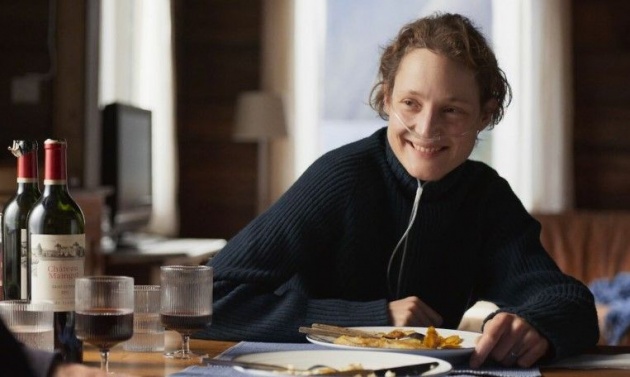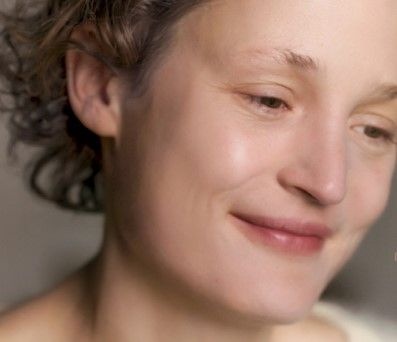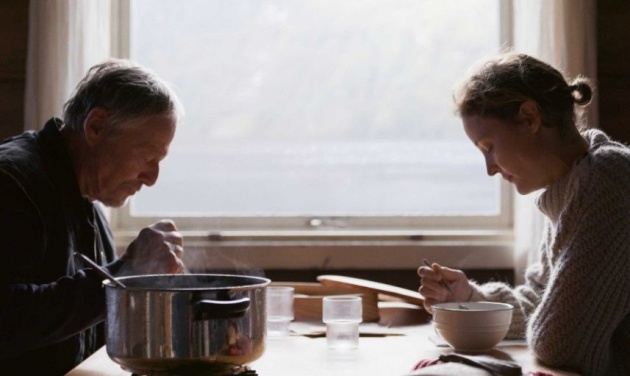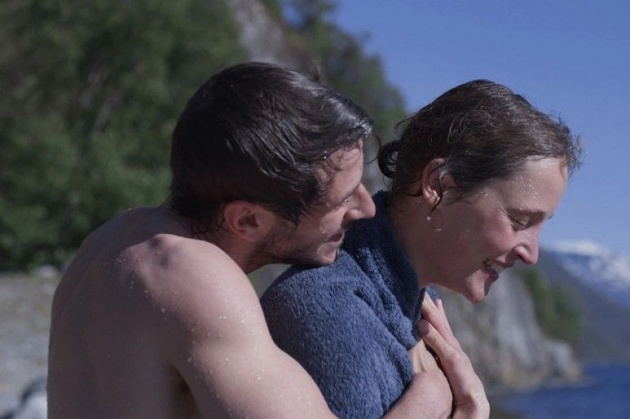
Pictured: Facing death on a full stomach, Hélène (Vicky Krieps) in a scene from the French language drama, 'Plus Que Jamais' ('More Than Ever'), co-written (with Lars Hubrich) and directed by Emily Atef. Still courtesy of Modern Films (UK)
Contains spoilers.
You wait for a film in which a married woman played by Vicky Krieps travels to a Nordic country and two arrive within twelve months. Krieps’ terrific central performance in co-writer-director Emily Atef’s French language drama, Plus Que Jamais (More Than Ever) is award-worthy by any reasonable measure of quality. It follows her lighter turn as a filmmaker in Mia Hansen-Løve’s Bergman Island, in which her character travelled to the late Ingmar Bergman’s home for inspiration, as well as her performance in the fanciful year-in-the-life of Empress Sisi in Marie Kreutzer’s Corsage. Krieps has more interesting roles in films by women directors than in the work of their male counterparts, Paul Thomas Anderson’s Phantom Thread notwithstanding. Her achievements on screen have reached a purple patch.
Co-written by Lars Hubrich, More Than Ever explores a simple truth more clearly than any film I’ve seen on the subject: the living and dying have nothing to say to one other. It isn’t just that Mathieu (Gaspard Ulliel in his final screen role before dying in a tragic skiing accident aged 37) is optimistic, believing that a lung transplant will save his afflicted wife, Hélène (Krieps). Rather than Hélène doesn’t fancy her chances, nor particularly wants to find out whether her body will accept someone else’s lungs – assuming a donor is found. She has accepted that her condition, IPF – Idiopathic Pulmonary Fibrosis – which involves a shortness of breath and is rare in people under fifty, will thicken her lungs to the point that she cannot breathe. There is no known cure. Hélène doesn’t want to die in public. She chooses something else.
Whether a choice of the actor or her director, Krieps transforms her appearance very slightly but in a pronounced way by shaving the size of her eyebrows so only a small part of each brow, towards the bridge of her nose, is thick. It is a shorthand way of saying: ‘my whole is depleted’. Atef intercuts Hélène standing in her underwear, paralysed by the thought of the approaching evening, with a view from underwater, bursting briefly to the surface and seeing tens of migrating birds in close formation flying east (or looking for fish). It is a striking transition and a metaphor for Hélène’s condition – she is more under the surface, struggling for breath – than not.

Pictured: An illustration of Vicky Krieps' shaved eyebrows in a scene from the French language terminal illness drama, 'Plus Que Jamais' ('More Than Ever'), co-written with Lars Hubrich and directed by Emily Atef. Still courtesy of Modern Films (UK)
Mathieu is attentive, sympathetic, but misguided. At the start he offers to help her apply her make up. Hélène allows him to do so. However, she doesn’t hide her discomfort. At the party, when offered something to drink, she requests only water – the other guests ask (jokingly) for champagne or a beer. She bridles when asked whether she will return to work. An acquaintance, Audrey (Marion Cadeau), announces she is pregnant. Hélène doesn’t offer enthusiastic congratulations. She knows that her life has diverged from the point when you share experiences and offer comfort to one another. We see her open the door to the refrigerator. ‘What are you looking for me?’ the host asks her. ‘Some ice,’ she replies. The host obliges. ‘Would you like some more water?’ ‘No.’ At the dinner table, when wine is poured, Hélène expresses her displeasure. She knows they all want to see her, but she isn’t prepared to normalise her condition, to make her own suffering a feature of social events. She leaves. Mathieu follows her. He is critical but also understanding, if not exactly accepting that socialising is a bad idea.
The search for ice prefigures her destination but also speaks to a deeper need, to live out the rest of her days in a cold but practical way. We see her in a doctor’s office, informed about the potential for a lung transplant. Mathieu is disappointed that Hélène isn’t more enthusiastic.
At her laptop, Hélène searches on a fictional search engine for content that describes living with an incurable disease. All the results are in English, which I found surprising. She discovers a blog written by Mister (not to be confused with the tyrant in The Color Purple) that features photographs, including of a man in a medical gown revealing his bare bottom. Hélène writes him a fan email. Surprisingly, he writes back.
Mathieu takes Hélène to a rock concert at which she behaves almost normally. Music offers a chance to commune with other people without the need for dialogue. We share her view, the heads and shoulders of other audience members obscuring the musicians on stage. A blue light is cast over the audience. Hélène moves slower, an idea crystallizing in her mind.
She has a web call with Mister, who chooses not to show himself. ‘You’re different from the others who write to me,’ he explains. ‘Women send me naked pictures of themselves. Men too.’ Hélène explains that she likes his blog because he doesn’t use words. Mister accepts the compliment.
Later, Hélène explains her plan to Mathieu: that she wishes to travel to Norway. ‘I’ve enquired and it can be done cheaply.’. Mathieu says that she can have someone cover for him so they can make the trip. Hélène insists that she goes alone. ‘What happens if they find a donor?’ Mathieu asks. Hélène intimates that she will return. ‘But you hate flying!’ he insists. ‘I’ll travel by train.’ A montage of train journeys follows, with Hélène occupying a window seat, the landscape whizzing past her. The final part of her journey is by ferry where she is met by Mister, who explains that his name is Bent (Bjørn Floberg). ‘You look different from what I imagined,’ Hélène explains in English – the language of subsequent scenes. ‘The man in the hospital gown? That was my roommate,’ explains Bent. He drives her to his home. Close to the lake is a hut. This is where Hélène will sleep. ‘If you need to go to the toilet, come up to the house,’ he tells her.

Pictured: 'I hope you like soup.' Bent (Bjørn Floberg) and Hélène (Vicky Krieps) share a meal in the French language drama, 'Plus Que Jamais' ('More Than Ever'), co-written with Lars Hubrich and directed by Emily Atef. Still courtesy of Modern Films (UK)
Bent has – or had – cancer. His life was one long series of treatments. He is a retired oil worker living alone. We later discover that he had a wife and children – and a backstory. He offers Hélène tea and soup, the latter containing fish – pretty much the only meal he has. Hélène is glad of the hospitality. It isn’t immediately clear what she intends to do now she has arrived. What she would like to do is sleep, but the constant daylight does not allow for this. She goes for a swim in the cool water but almost slips from the ladder as she climbs down. She wants to send Mathieu an SMS but there is no signal. Bent offers her his landline – but it is clear that Hélène doesn’t want a conversation – and advises her she needs to go to the top of a hill to use her phone. We see her go for a walk passing a sign with a wi-fi symbol where normally we might see a description of a point of interest. At the top there is a disparate collection of people making calls - a surreal sight. This is the nearest the movie comes to inducing a belly laugh. Hélène calls Mathieu and explains that she is staying in a hotel with no wi-fi. She offers him a view of the surroundings. He is furious, having not heard from her in two days. ‘You expect me not to worry?’
After nights of not sleeping, Hélène asks to sleep in Bent’s bed just for a few hours. He agrees. Hélène sleeps for longer. Bent offers to sleep on the couch but she insists that he shares the bed. Their relationship isn’t sexual. It is clear that Hélène isn’t looking for someone to replace Mathieu.
She does however experience a turn for the worst, succumbing to a coughing fit while on a walk. She sees Bent receive a visitor, a woman his age – Bent is in his late sixties, or older. She asks about her. Bent tells her to drop it. Later, she buys Bent pizza. They sit at an open bench. ‘I sat on this exact bench years ago,’ explains Bent. He explains that the woman who was visited was the wife of his best friend, who died in a fire on the rig. There is a memorial service each year. Bent won’t attend. He explains that afterwards his wife and son couldn’t bear it and left. We see a metal sculpture that commemorates the dead.
Noting the model house that Bent made to amuse himself, Hélène explains that she too used to make things. She explains the changes she would make to the house, improving the lay out. She calls Mathieu again and explains that she has moved out of the hotel and had met a man who offered her the chance to stay in his hut. Mathieu explodes, explaining that it is hard for him to be apart from her. He resolves to visit her.

Pictured: 'How do you like the water?' Mathieu (Gaspard Ulliel) dries off his wife, Hélène (Vicky Krieps) in a scene from the French language drama, 'Plus Que Jamais' ('More Than Ever'), co-written (with Lars Hubrich) and directed by Emily Atef. Still courtesy of Modern Films (UK)
On arrival, he becomes an awkward house guest, though nude bathing in the lake does temper his mood somewhat – she is glad to wrap Hélène up in a blue towel. Watching her prepare breakfast alongside Bent, he feels that he has been replaced. When Bent talks about the embankment he built, Mathieu punches him, as if there is some male code that Bent has violated. Bent leaves.
Spending the night with Mathieu in the hut, Hélène initiates lovemaking, what we initially perceive as reconciliation sex – there are lingering shots of Hélène’s hand close to Mathieu’s blue underwear. The love scene transports the audience out of the drama, briefly – as love scenes often do. The next day, Hélène leaves a note for Bent on the table next to a cardboard model of a re-modelled house. We expect her to leave with him – all the cases are removed – but in fact sees him off on the ferry. It is unclear where she will go next.
At one point, Hélène smokes a joint with Mathieu. We see a multitude of expressions of her face as she breathes in something that will no doubt impair her lungs. In this moment, Krieps is alive on screen in front of us, barely distinguishable from her character. The title of the film (in English at least) doesn’t fit the reconciliation to death that we see unfold. Nevertheless, the film is impressive and exact, entirely lacking in sentimentality – the ice again – and radiating truth.
Reviewed at Curzon Canterbury, Kent, Southern England, Saturday 28 January 2023, 17:50 screening



